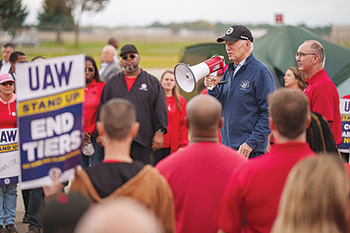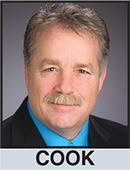
A year from today, we will be embroiled in what will likely be a contentious and exhausting election. As President Joe Biden fights for a second term against the Republican nominee — likely a rematch of 2020 with Donald Trump if polling holds — we will be flooded with the usual noise that comes with an election. There will be debates and ads, more than a few arguments in the comment sections across the internet, and the typical ugliness that comes with the season.
Why am I bringing all of this up more than a year before the next election? I have said many times that elections matter and that politics is personal for working people. I don’t think the average voter knows just how much politics impact a worker’s ability to get a better life.
Sure, we’ve all seen the headlines about inflation or found ourselves quietly cursing when gas prices go up. The things happening behind the scenes — the nitty gritty of state and federal law — are just as impactful, and rarely discussed by the average American.
NEW FRAMEWORK
Less than two months ago, the National Labor Relations Board (NLRB) issued a new framework governing how union elections are handled in the workplace, and the sweeping changes have the potential to make it dramatically more difficult for employers to engage in union busting. These kinds of changes are announced in press releases most voters will never see. They are nuanced decisions often written using complex or specialized lingo that not everyone understands. They still are wildly impactful.
Under the new framework, which stems from a decision the NLRB reached in a case between the Teamsters Union and Cemex Construction Materials Pacific LLC, prohibits employers from holding one-on-one meetings with employees to discuss union campaigns. This tactic is one of many that employers use to intimidate or threaten workers from exercising their legal rights.
The ruling will also make it easier for workers to hold elections and speed up the process by making it harder for employers to delay those elections with frivolous NLRB charges.
PRESIDENTIAL CAMPAIGN
What does this all have to do with a presidential campaign that won’t be decided for more than a year? The NLRB is subject to appointments from the President of the United States. Under Donald Trump, and numerous Republican predecessors, the board has often been stacked with corporate attorneys with clear and explicit anti-labor bias. This means that during those presidential terms, it was harder for workers to organize a union, or to properly get justice if they are wronged by their employer.
This isn’t an effort to smear one political party. Republican voters often voice concerns about the same problems as Democrat voters. In fact, most voters seem to be able to agree broadly on a few things that will improve all our lives. They agree by a wide margin, according to polls, that the minimum wage is too low, that companies shouldn’t be incentivized to send good jobs overseas, that corporate bosses are too often disconnected from their workforce and more concerned with their own bonuses and bottom lines than with the well-being of their workforce.
Sadly, elected leaders in both parties have failed time and time again to meaningfully solve these issues.
HISTORIC FIRST
As if to emphasize how important it is to walk the walk and not just talk the talk, President Biden did something just a few weeks ago that was a historic first. Biden joined UAW workers on their picket line as they fight for a better contract against the Big Three American automakers. It was the first time in history that a sitting president walked on a picket line.
Biden’s clear support of striking workers, his appointed NLRB pushing back against union busting in ways we haven’t seen in a generation, are all indicative of just how much support there can and should be from our elected leaders to empowered workers.
Conversely, Donald Trump couldn’t even be bothered to speak to union workers when he visited Michigan to talk to auto workers. His companies regularly busted union activity, and he’s always been on the side of corporate interests.
ELECTIONS HAVE CONSEQUENCES
Elections matter. They have consequences. Our leaders should reflect the voters, and one thing most voters seem to agree on is that the working people of this country have been getting a raw deal for far too long. It’s easy for politicians to say they agree with that statement, but those words ring hallow when they turn around and slash taxes for rich Americans and try to turn working class families against each other by forever focusing on our differences instead of the many things we have in common.
As we inch closer to the election, you will hear countless stories that are designed to distract us. There will be personal attacks and wildly outlandish rhetoric. There will be people who want our elections to be about culture wars and not about the actual quality of life we all deserve. I hope you’ll join me in ignoring these distractions and asking yourself: what will these politicians do for people like me, other than just talk?


